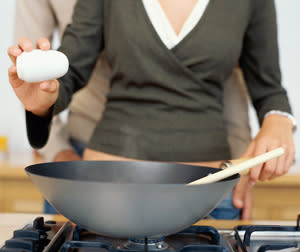Top cooking tips from Food Network’s 100 greatest list

By Sarah B. Weir
Food Network recently came out with its list of 100 greatest cooking tips of all time from America's best chefs. We narrowed this down to the 15 easiest and most useful tips for the home cook because we know how busy you are.
These brilliant culinary tricks target common cooking problems and will help you make restaurant-quality food in your own kitchen while saving time, money, and frustration. Preparing food at home is also great for your health and the planet's.
1. Problem: Less than zesty dried herbs and spices.
Tip: Store spices in a cool, dark place, not above your stove. Humidity, light, and heat will cause herbs and spices to lose their flavor.
--From Rick Tramonto, Tramonto's Steak and Seafood, Osteria di Tramonto, and RT Lounge, Wheeling, IL
2. Problem: How to get rich flavor without fat.
Tip: For rich, creamy dressings made healthy, substitute half the mayo with Greek-style yogurt.
--From Ellie Krieger, Healthy Appetite With Ellie Krieger
3. Problem: Can't chop herbs evenly.
Tip: When chopping herbs, toss a little salt onto the cutting board; it will keep the herbs from flying around.
--From Joanne Chang, Flour & Bakery Café, Boston
4. Problem: Dry, flat, or tough baked goods.
Tip: For best results when you're baking, leave butter and eggs at room temperature overnight.
--From Ina Garten, Barefoot Contessa: Back to Basics
5. Problem: Boring roast chicken.
Tip: Instead of placing a chicken on a roasting rack, cut thick slices of onion, put them in an oiled pan, then place the chicken on top. The onion will absorb the chicken juices. After roasting, let the chicken rest while you make a sauce with the onions by adding a little stock or water to the pan and cooking it for about 3 minutes on high heat.
--From Donald Link, Cochon and Herbsaint, New Orleans
6. Problem: Runny pasta sauce.
Tip: Do not use oil in the water when boiling pasta: It will keep the sauce from sticking to the cooked pasta.
--From Missy Robbins, A Voce, New York City
7. Problem: Ho-hum green salad.
Tip: When seasoning a salad, use coarse salt mixed with a little olive oil. It will stay crunchy when combined with the vinaigrette.
--From Paul Liebrandt, Corton, New York City
8. Problem: Soggy veggies.
Tip: Don't overcrowd when you're sautéing -- it will make your food steam instead.
--From Ryan Poli, Perennial, Chicago
9. Problem: Lumpy mashed potatoes.
Tip: When making mashed potatoes, after you drain the potatoes, return them to the hot pan, cover tightly and steam for 5 minutes. This allows the potatoes to dry out so they'll mash to a beautiful texture and soak up the butter and cream more easily.
--From Wolfgang Puck, Spago, Los Angeles
10. Problem: Unevenly grilled meat.
Tip: When you grill, pull your steaks [or other meat] out of the refrigerator one hour ahead of time so they can come to room temperature.
--From Geoffrey Zakarian, The Lambs Club and The National, New York City
11. Problem: Sharp, bitter garlic.
Tip: Always buy the freshest garlic you can find; the fresher it is, the sweeter it will be. The best garlic has firm, tissue-like skin and should not be bruised, sprouted, soft, or shriveled. If you find cloves that have green shoots, discard the shoots -- they will only add bitterness.
--From Todd English, The Plaza Food Hall by Todd English, New York City
12. Problem: Stuck in a flavor rut.
Tip: Recipes are only a guideline, not the Bible. Feel comfortable replacing ingredients with similar ingredients that you like. If you like oregano but not thyme, use oregano.
--From Alex Seidel, Fruition, Denver
13. Problem: Slimy lettuce with a short shelf life.
Tip: Prolong the lifespan of greens by wrapping them loosely in a damp paper towel and placing in a re-sealable bag. That local arugula will last about four days longer.
--From Hugh Acheson, Five & Ten, Athens, GA
14. Problem: Undercooked or burnt onions.
Tip: Caramelize onions very quickly by cooking them in a dry nonstick sauté pan over medium-high heat. They will caramelize beautifully in a lot less time then with traditional methods.
--From Michael Mina, Bourbon Steak and Michael Mina Restaurants
15. Problem: Getting the most out of your same old, same old spaghetti.
Tip: Whenever you cook pasta, remove some of the pasta-cooking water (about 1/4 or 1/3 cup) just before draining. When you add the sauce of your choice to the pasta, add a little of the cooking liquid. This helps the sauce to amalgamate; the starch in the water adds body and a kind of creaminess. An old Italian friend instructed me in this finishing touch early on, and I would never, ever leave it out. It makes all the difference.
--From Nigella Lawson, Nigella Kitchen
Want more tips? Check out the complete list.
What are your favorite kitchen tips and tricks? Please share in the comments below.
